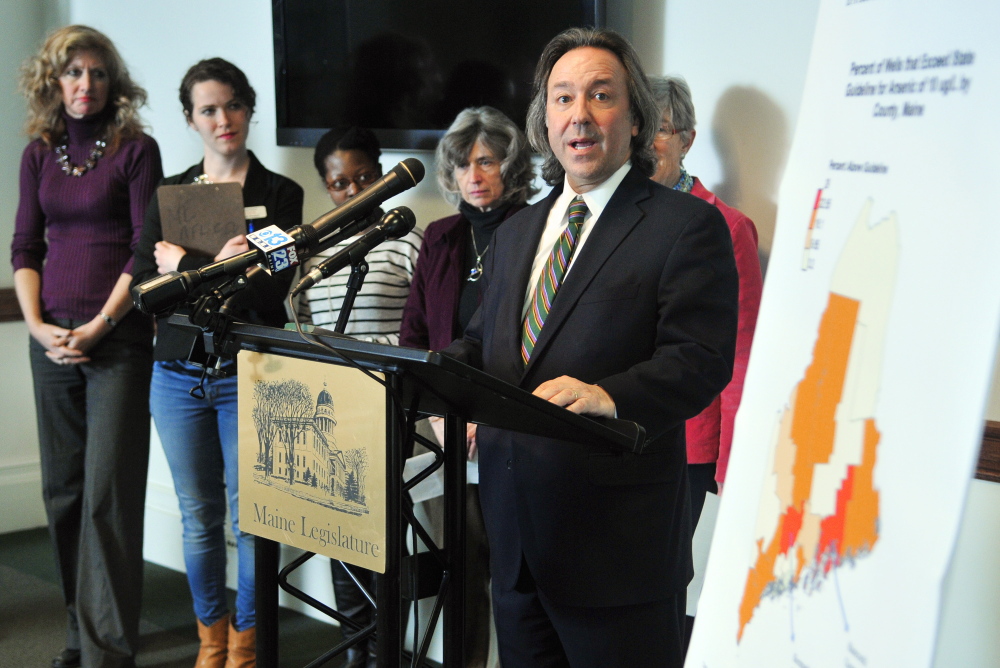AUGUSTA — A legislative effort to promote well water testing in Maine was nixed this week when legislators failed to override a veto from Gov. Paul LePage.
The bill, sponsored by Rep. Drew Gattine, D-Westbrook, was a response to recent scientific findings on arsenic, a carcinogen occurring naturally in Maine’s bedrock, which is a particular problem in central and Down East portions of the state. Statewide, 150,000 people — one in 10 residents — could be drinking from wells with high arsenic concentrations, according to a Dartmouth University study.
When it was introduced, Gattine’s proposal would have mandated testing on new wells and imposed fees to be used by the state to fund education and remediation for low-income Mainers, but it was scaled back to fund education programs by imposing fees on tests conducted at the state-run Health and Environmental Testing Laboratory.
The bill passed in both chambers of the Legislature in bipartisan June votes, but in a Friday veto letter, LePage called the bill “unnecessary,” noting that between 2003 and 2012, the number of Mainers who reported knowing whether their well had been tested rose from 26.5 percent to 45 percent. The Republican said the bill would assess fees “to support work that is already being done.”
Legislators fell four votes shy on Tuesday of the 98 needed to override the veto. The Maine Department of Health and Human Services does outreach on well testing under existing resources and won a $300,000, two-year grant in 2013 to support testing at three Healthy Maine Partnerships, but the grant ends this year and advocates say the state needs a steady stream of education funding to increase testing.
“We will continue to try to make sure that people know what they need to do in terms of testing and keeping their kids and themselves safe,” Gattine said.
In the initial House vote, Gattine’s bill was backed by 27 Republicans, including four who represent parts of Kennebec County, where 29 percent of private wells tested by the state between 2005 and 2009 had higher concentrations than the federal arsenic standard for public drinking water, more than any other Maine county.
The issue gained more attention last year, when scientists from Columbia University and the University of New Hampshire released a five-year study of 272 students in grades 3 through 5 at schools in Manchester, Readfield, Monmouth, Wayne, Mount Vernon and Hallowell who were exposed to arsenic in water. It found that exposure to even low levels could lower IQ levels by as many as six points on a test.
One of those Republicans who switched their votes to oppose the bill, Rep. Randall Greenwood, of Wales, said he has treated his home for arsenic. But in the initial vote, he was “unaware” that the bill would have affected only the state laboratories and said it wouldn’t have accomplished much. But he called arsenic a big problem, saying he hopes the department can fund outreach within existing resources.
But Emma Halas-O’Connor, a coordinator with the Environmental Health Strategy Center, a group that fights toxic chemicals, said in a news release that “this problem isn’t going away unless we take action.”
“We’re committed to continuing our efforts to promote safe drinking water beyond this legislative session,” she said.
Michael Shepherd — 370-7652
Twitter: @mikeshepherdme
Send questions/comments to the editors.



Success. Please wait for the page to reload. If the page does not reload within 5 seconds, please refresh the page.
Enter your email and password to access comments.
Hi, to comment on stories you must . This profile is in addition to your subscription and website login.
Already have a commenting profile? .
Invalid username/password.
Please check your email to confirm and complete your registration.
Only subscribers are eligible to post comments. Please subscribe or login first for digital access. Here’s why.
Use the form below to reset your password. When you've submitted your account email, we will send an email with a reset code.